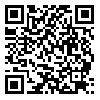

BibTeX | RIS | EndNote | Medlars | ProCite | Reference Manager | RefWorks
Send citation to:
URL: http://rbs.mui.ac.ir/article-1-672-en.html
2- Assistant Professor, Young Researchers and Elite Club, Neyshabur Branch, Islamic Azad University, Neyshabur, Iran ,
Aim and Background: Inability in cognitive processing, emotional awareness, and emotion regulation is called Alexithymia. The alexithymia is a common problem among people. The purpose of this study was to determine the effect of emotional regulation instruction on alexithymia of high school students.
Methods and Materials: The research method was a semi-experimental design with pre-test and post-test with control group. The statistical population of this study included all female secondary high school students of Neyshabur who studying in the academic year of 2017-18. Among 20 high school students, 30 subjects were selected clustered sampling method and assigned in two control group (n=15) and experimental group randomly (n=15). The intervention program was conducted in 8 sessions of 90 minutes, weekly for the experimental group and the control group received was in wait list. Data were analyzed using covariance analysis
Findings: The findings of the study showed that emotional regulation training reduced alexithymia (p<.001).
Conclusions: To explain the above results, it can be said that are affected by the emotional ordering of individuals, so that the training of emotional regulation skills reduces alexithymia.
Received: 2020/02/8 | Accepted: 2020/02/25 | Published: 2020/02/25
| Rights and permissions | |
 |
This work is licensed under a Creative Commons Attribution-NonCommercial 4.0 International License. |





